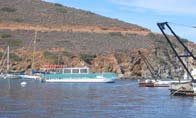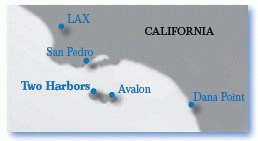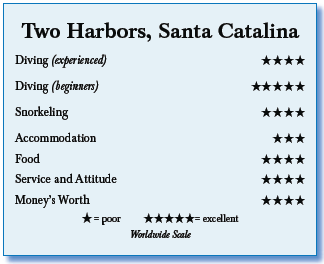Two Harbors, Santa Catalina Island, CAContents of this Issue: Two Harbors, Santa Catalina Island, CA Vista Sea Sports, Baja California, Mexico Recalls for a Regulator and a BCD Boldly Wear What No Diver Has Worn Before Barra Lodge and Diving, Mozambique A Diverís Report From Copenhagen Diving the World: A Guide to the Worldís Most Popular Dive Sites Embarrassing Dive Moment Leads to a Major Diet San Diego Dive Shop With a Dark History Grand Cayman Officials Say Alcohol and Stingrays Do Mix Hawaii Crushes a Reef with 50 Tons of Concrete Editorial Office: Ben Davison Publisher and Editor Undercurrent 3020 Bridgeway, Suite 102 Sausalito, CA 94965 the other Catalina from the February, 2010 issue of Undercurrent
Dear Fellow Diver: If you stroll around the scrubby town of Two Harbors on Santa Catalina Island, you may feel like youíre in a 60s time warp by the music wafting from behind the open-air bar, the only bar in town. But itís not much of a town. Thereís a hotel, probably last decorated in the 60s, a smattering of houses and places to stay for students on field trips, and a dive shop smack on the pier where the ferry docks when it arrives from San Pedro in Los Angeles Harbor. Two Harbors is a two-hour bus ride to Avalon, the town with all the action.
The Banning House, perched on a small hill above town, is
as comfortable as a shaggy old sweater, but not particularly
welcoming. When I stayed there, I had Room 8, apparently the
most expensive in the place because it had a few more square
feet, a couple of chairs and a porch that doubled as a patio.
It also had an expansive view of the remote Catalina Harbor
on the west side of the island, but so did most other rooms.
Room 4, with a shared patio, might be the best deal in the
house. Only breakfast was served, a modest buffet with fresh
fruits, a couple of cereals, little sweet rolls. So lunches
of burgers, fish and chips, etc., were down the hill at the
West End Galley. Dinners at the Harbor Reef restaurant were
a reasonably priced variety of decent pastas, meats and fish,
with prompt service and a full bar. It was a five-minute walk
or a hotel employee
was always willing to
drive guests back and
forth. (Occasionally
a bison or two wandered
by, their ancestors
brought to the
island decades ago for
a movie but now in
peaceful retirement.)
Aside from climbing
the hills, walking a
few dusty roads, or
kayaking, staying here is all about diving -- the best land-based diving
in California. -- Ben Davison * * * * * Most of the diving here takes place in and around a marine invertebrate preserve just off Isthmus Cove on the west end of the island, facing Long Beach. Although Iíve dived Catalina for years, I was blown away by the water clarity and scenery. Lobsters, eels and other fearless critters posed patiently for photographers. Brilliant orange Garibaldis were in my face like border guards. (They must know theyíre the stateís official marine fish and therefore protected.) Two Harbors Dive & Recreation Center, a full service PADI operation, runs a 45-foot dive boat, named -- guess what? -- the Garibaldi. It rides smoothly on a catamaran hull, is square-ended fore and aft, can hold up to 24 divers, and has a marine head. While THDRC isnít exactly a valet diving operation, the conscientious crew attended to details. On the most recent trip, my first dive, at a site called the Sphinx, set the tone. Seated on a bench amidships, under the cover of a canvas awning, I set up my tank and BCD on an aluminum 80 filled to 2800 psi, which I humped back to the spacious openair fantail. Sitting on the deck with my feet on a surface-level swim step, I pulled on my fins and divemaster Josh helped me into my BCD and I stepped right in, no giant stride required. THDRC offers either guided or individual diving, but the guided tours must include all divers. So we opted to dive on our own, following the thorough briefing given by Captain Dave. The only glitch occurred when two divers, wearing rental suits, were improperly weighted and had to return to the boat. My buddy and I swam to a wall forested with bull kelp, where I could sample the beauty of the huge leafy vegetation without risking entanglement, or penetrate as deeply as I wished. Fog had rolled in so there wasnít much color underwater, and visibility was only 30 feet. At 1500 psi, we turned back and after a leisurely downcurrent kick in 68-degree water, I heard classical music playing! The Garibaldi crew lowers an underwater amplifier to help divers find their way back. Following the sound, I hovered under the boat for my safety stop, then kicked up to the three-part swim step. It was easy to pull myself onto the submerged center portion, then sit on one of the surface-level platforms while Josh removed my tank. After I had stowed my gear, Josh offered me a cup of hot chocolate, but no towel -- bring your own. In the 70-degree weather, I managed to drip dry. In mid-October, my group had the Banning House almost to ourselves and with as few
as two divers, the Garibaldi was virtually a private charter. On my second day, the sun came out and visibility improved to 40 feet at Parsonís Point, near a campground outside the preserve. In bright sunshine, I enjoyed viewing a lush array of kelp and other vegetation. Showy little blue-banded gobies were everywhere. The Garibaldi deployed a current line but they never dropped us in a site with substantial current. In fact, they revisited a few sites until they decided the current was dive-ready. At Emerald Bay, I stayed above 33 feet to enjoy the play of sunlight on colorful gorgonians, with just enough surge to keep things flowing. Streams of bait fish swooped by, just out of reach of the photographers who were diving solo. I even spotted a few living abalone -- an encouraging find in an area where the tasty mollusks had been hunted nearly to extinction in the 80s. Theyíre still protected in the Channel Islands -- for now. Visibility continued to improve to 50 feet or more with increasingly sunny weather as we visited sites like Sea Fan Grotto, rarely-dived Eagle Reef and Isthmus Reef, occasional home to giant black sea bass, which were out when we came to call. Conditions were gentle and none of my dives exceeded 75 feet. On our final day, we arranged a tour of the University of Southern California Catalina Hyperbaric Chamber, reachable by water taxi or kayak from Two Harbors. Operations Manager Lorraine Sadler gave us a primer in decompression theory, and then led eight of us into the chamber. She secured the hatches and took us down the equivalent of one foot underwater. I felt the pressure immediately in my ears, and could only imagine what a two-hour treatment at a depth equivalent of 60 feet would be like. It was a sobering experience. Hopefully, Iíll be able to enjoy diving Two Harbors again without a return trip to the chamber. -- Larry Clinton
|

I want to get all the stories! Tell me how I can become an Undercurrent Online Member and get online access to all the articles of Undercurrent as well as thousands of first hand reports on dive operations world-wide
| Home | Online Members Area | My Account |
Login
|
Join
|
| Travel Index |
Dive Resort & Liveaboard Reviews
|
Featured Reports
|
Recent
Issues
|
Back Issues
|
|
Dive Gear
Index
|
Health/Safety Index
|
Environment & Misc.
Index
|
Seasonal Planner
|
Blogs
|
Free Articles
|
Book Picks
|
News
|
|
Special Offers
|
RSS
|
FAQ
|
About Us
|
Contact Us
|
Links
|
3020 Bridgeway, Ste 102, Sausalito, Ca 94965
All rights reserved.


 Iíll let my colleague describe it,
because he has also dived round the island on liveaboard
boats and has a lot to compare it to.
Iíll let my colleague describe it,
because he has also dived round the island on liveaboard
boats and has a lot to compare it to. On our second day, we
rescheduled the departure time to 9:30
a.m., allowing for a leisurely breakfast.
We also could request specific
dive sites, so I was able to avoid some
in the area I consider liveaboard clichťs,
like Bird Rock and Ship Rock. At
the end of the day, I left my regulator
and BCD on the Garibaldi, rinsed the
rest of my gear and hung it on a drying
rack at the shop. Shop manager Hilary
moved everything indoors overnight,
even after our last day of diving -- a
thoughtful service that let us pack relatively
dry gear for our trip home.
On our second day, we
rescheduled the departure time to 9:30
a.m., allowing for a leisurely breakfast.
We also could request specific
dive sites, so I was able to avoid some
in the area I consider liveaboard clichťs,
like Bird Rock and Ship Rock. At
the end of the day, I left my regulator
and BCD on the Garibaldi, rinsed the
rest of my gear and hung it on a drying
rack at the shop. Shop manager Hilary
moved everything indoors overnight,
even after our last day of diving -- a
thoughtful service that let us pack relatively
dry gear for our trip home.  Diverís Compass: Most of my group flew into Long Beach and chartered a
shuttle to the Catalina Express ferry terminal in San Pedro
(
Diverís Compass: Most of my group flew into Long Beach and chartered a
shuttle to the Catalina Express ferry terminal in San Pedro
(